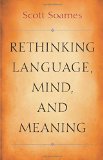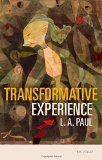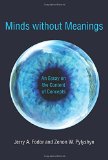June 16, 2015

Dreaming: A Conceptual Framework for Philosophy of Mind and Empirical Research by Jennifer M. Windt (MIT Press, 2015)
(amazon.co.uk)
Book description from the publisher:
Dreams, conceived as conscious experience or phenomenal states during sleep, offer an important contrast condition for theories of consciousness and the self. Yet, although there is a wealth of empirical research on sleep and dreaming, its potential contribution to consciousness research and philosophy of mind is largely overlooked. This might be due, in part, to a lack of conceptual clarity and an underlying disagreement about the nature of the phenomenon of dreaming itself. In Dreaming, Jennifer Windt lays the groundwork for solving this problem. She develops a conceptual framework describing not only what it means to say that dreams are conscious experiences but also how to locate dreams relative to such concepts as perception, hallucination, and imagination, as well as thinking, knowledge, belief, deception, and self-consciousness.
Arguing that a conceptual framework must be not only conceptually sound but also phenomenologically plausible and carefully informed by neuroscientific research, Windt integrates her review of philosophical work on dreaming, both historical and contemporary, with a survey of the most important empirical findings. This allows her to work toward a systematic and comprehensive new theoretical understanding of dreaming informed by a critical reading of contemporary research findings. Windt’s account demonstrates that a philosophical analysis of the concept of dreaming can provide an important enrichment and extension to the conceptual repertoire of discussions of consciousness and the self and raises new questions for future research.
Google Books preview:
Comments (0)
- consciousness,new books,philosophy of mind,self
May 26, 2015

Rethinking Language, Mind, and Meaning (Carl G. Hempel Lecture Series) by Scott Soames (Princeton University Press, 2015)
(kindle ed.), (amazon.co.uk), (UK kindle ed.)
Book description from the publisher:
In this book, Scott Soames argues that the revolution in the study of language and mind that has taken place since the late nineteenth century must be rethought. The central insight in the reigning tradition is that propositions are representational. To know the meaning of a sentence or the content of a belief requires knowing which things it represents as being which ways, and therefore knowing what the world must be like if it is to conform to how the sentence or belief represents it. These are truth conditions of the sentence or belief. But meanings and representational contents are not truth conditions, and there is more to propositions than representational content. In addition to imposing conditions the world must satisfy if it is to be true, a proposition may also impose conditions on minds that entertain it. The study of mind and language cannot advance further without a conception of propositions that allows them to have contents of both of these sorts. Soames provides it.
He does so by arguing that propositions are repeatable, purely representational cognitive acts or operations that represent the world as being a certain way, while requiring minds that perform them to satisfy certain cognitive conditions. Because they have these two types of content—one facing the world and one facing the mind—pairs of propositions can be representationally identical but cognitively distinct. Using this breakthrough, Soames offers new solutions to several of the most perplexing problems in the philosophy of language and mind.
Google Books preview:
See also: Author’s webpage
Comments (0)
- language,new books,philosophy of mind
February 1, 2015

Seeing Things as They Are: A Theory of Perception by John R. Searle (Oxford University Press, 2015)
(kindle ed.), (amazon.co.uk), (UK kindle ed.)
Book description from the publisher:
This book provides a comprehensive account of the intentionality of perceptual experience. With special emphasis on vision Searle explains how the raw phenomenology of perception sets the content and the conditions of satisfaction of experience. The central question concerns the relation between the subjective conscious perceptual field and the objective perceptual field. Everything in the objective field is either perceived or can be perceived. Nothing in the subjective field is perceived nor can be perceived precisely because the events in the subjective field consist of the perceivings , whether veridical or not, of the events in the objective field.
Searle begins by criticizing the classical theories of perception and identifies a single fallacy, what he calls the Bad Argument, as the source of nearly all of the confusions in the history of the philosophy of perception. He next justifies the claim that perceptual experiences have presentational intentionality and shows how this justifies the direct realism of his account. In the central theoretical chapters, he shows how it is possible that the raw phenomenology must necessarily determine certain form of intentionality. Searle introduces, in detail, the distinction between different levels of perception from the basic level to the higher levels and shows the internal relation between the features of the experience and the states of affairs presented by the experience. The account applies not just to language possessing human beings but to infants and conscious animals. He also discusses how the account relates to certain traditional puzzles about spectrum inversion, color and size constancy and the brain-in-the-vat thought experiments. In the final chapters he explains and refutes Disjunctivist theories of perception, explains the role of unconscious perception, and concludes by discussing traditional problems of perception such as skepticism.
Google Books preview:
Comments (0)
- new books,philosophy of mind
December 31, 2014

Transformative Experience by L.A. Paul (Oxford University Press, 2015)
(kindle ed.), (amazon.co.uk), (UK kindle ed.)
Book description from the publisher:
As we live our lives, we repeatedly make decisions that shape our future circumstances and affect the sort of person we will be. When choosing whether to start a family, or deciding on a career, we often think we can assess the options by imagining what different experiences would be like for us. L. A. Paul argues that, for choices involving dramatically new experiences, we are confronted by the brute fact that we can know very little about our subjective futures. This has serious implications for our decisions. If we make life choices in the way we naturally and intuitively want to–by considering what we care about, and what our future selves will be like if we choose to have the experience–we only learn what we really need to know after we have already committed ourselves. If we try to escape the dilemma by avoiding an experience, we have still made a choice.
Choosing rationally, then, may require us to regard big life decisions as choices to make discoveries, small and large, about the intrinsic nature of experience, and to recognize that part of the value of living authentically is to experience one’s life and preferences in whatever way they may evolve in the wake of the choices one makes.
Using classic philosophical examples about the nature of consciousness, and drawing on recent work in normative decision theory, cognitive science, epistemology, and the philosophy of mind, Paul develops a rigorous account of transformative experience that sheds light on how we should understand real-world experience and our capacity to rationally map our subjective futures.
Google Books preview:
See also: Author’s website, Edge.org talk
Comments (0)
- cognitive science,new books,philosophy of mind
December 17, 2014

Minds without Meanings: An Essay on the Content of Concepts by Jerry A. Fodor and Zenon W. Pylyshyn (MIT Press, 2014)
(amazon.co.uk)
Book description from the publisher:
In cognitive science, conceptual content is frequently understood as the “meaning” of a mental representation. This position raises largely empirical questions about what concepts are, what form they take in mental processes, and how they connect to the world they are about. In Minds without Meaning, Jerry Fodor and Zenon Pylyshyn review some of the proposals put forward to answer these questions and find that none of them is remotely defensible. Fodor and Pylyshyn determine that all of these proposals share a commitment to a two-factor theory of conceptual content, which holds that the content of a concept consists of its sense together with its reference. Fodor and Pylyshyn argue instead that there is no conclusive case against the possibility of a theory of concepts that takes reference as their sole semantic property. Such a theory, if correct, would provide for the naturalistic account of content that cognitive science lacks — and badly needs. Fodor and Pylyshyn offer a sketch of how this theory might be developed into an account of perceptual reference that is broadly compatible with empirical findings and with the view that the mental processes effecting perceptual reference are largely preconceptual, modular, and encapsulated.
Google Books preview:
Comments (0)
- cognitive science,new books,philosophy of mind







